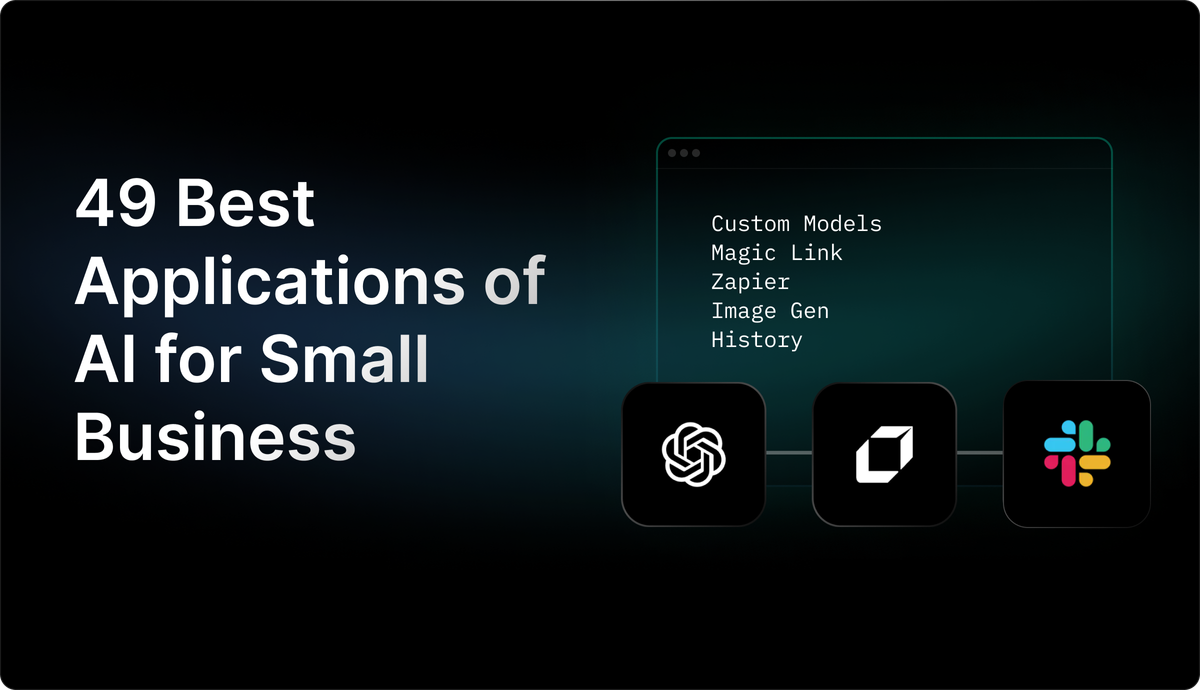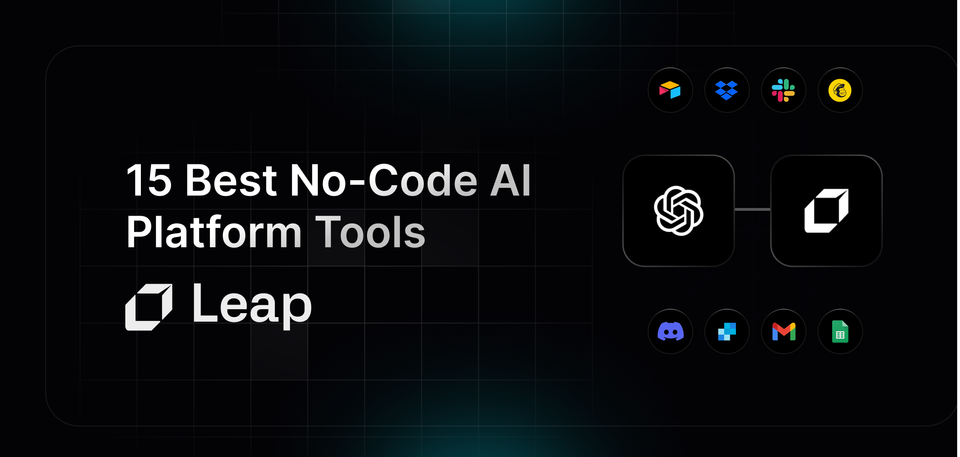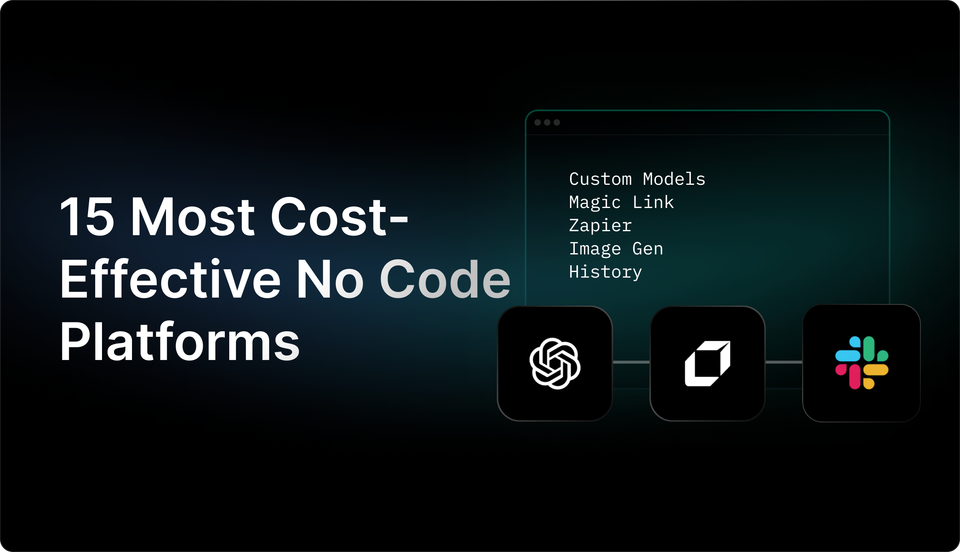49 Best Applications of AI for Small Business (& AI Workflows Tool)
Boost small businesses with AI solutions! Maximize efficiency, streamline operations, and stay competitive. Explore AI for small businesses now.

Let’s explore the endless possibilities and practical applications of AI for small business. Whether you are a startup owner or an established entrepreneur, embracing the power of AI can significantly enhance your productivity, streamline your operations, and boost your bottom line.
In the fast-paced world of commerce, staying ahead of the curve is essential. With the rapid advancement of AI technology, small businesses are no longer limited to manual processes or outdated systems. AI for small business offers a myriad of opportunities that can transform the way you operate, from automating mundane tasks to unlocking valuable insights from big data.
And the best part? You don't need to be a coding wizard to leverage the benefits of AI. With the emergence of no code AI solutions, even the least tech-savvy business owners can harness the power of AI to drive growth and innovation. So, let's dive into this exciting journey together and discover how AI can revolutionize your small business!

What's The Hype Behind AI for Small Business?

Artificial Intelligence (AI) has gained significant traction in recent years, and its influence is extending to the realm of small businesses. With advancements in technology and increased accessibility, AI is becoming more popular and sought after by small business owners. This surge in popularity can be attributed to several factors, including the potential benefits that AI offers to small businesses.
Enhanced Efficiency and Productivity
One of the primary advantages of AI is its ability to automate repetitive and mundane tasks. By leveraging AI-powered tools and software, small businesses can streamline their operations, freeing up valuable time and resources. Tasks such as data entry, inventory management, and customer support can be automated, allowing employees to focus on more strategic activities. This increased efficiency and productivity can ultimately lead to cost savings and improved business outcomes.
Improved Decision-Making
AI has the potential to provide small businesses with valuable insights and data-driven recommendations. By analyzing vast amounts of information, AI algorithms can identify patterns, trends, and correlations that may go unnoticed by humans. This data-driven approach enables small businesses to make more informed decisions, helping them stay ahead of the competition and identify growth opportunities.
Personalized Customer Experiences
Personalization has become a key differentiator for businesses. AI can play a crucial role in delivering personalized experiences to customers. By analyzing customer data and preferences, AI algorithms can tailor marketing campaigns, recommend relevant products or services, and provide personalized support. This level of personalization can enhance customer satisfaction, drive customer loyalty, and ultimately contribute to business growth.
Enhanced Cybersecurity
Cybersecurity is a growing concern for small businesses, as they are often targeted by cybercriminals. AI can help bolster cybersecurity efforts by detecting and mitigating potential threats. AI-powered security systems can continuously monitor networks, identify anomalies, and respond in real-time to potential breaches. Small businesses can benefit from AI's ability to provide proactive cybersecurity measures, reducing the risk of data breaches and protecting sensitive information.
Competitive Advantage
As AI becomes more prevalent, its adoption can give small businesses a competitive edge. AI-powered tools and technologies enable them to compete with larger enterprises by automating processes, improving efficiency, and delivering personalized experiences. Small businesses that embrace AI early on can position themselves as innovative and forward-thinking, attracting new customers and staying ahead of their competitors.
The rising popularity of AI for small businesses stems from its ability to enhance efficiency, improve decision-making, deliver personalized customer experiences, bolster cybersecurity, and provide a competitive advantage. With the potential benefits that AI offers, small businesses are increasingly leveraging this technology to drive growth, improve operations, and stay ahead in the ever-evolving business landscape.
Related Reading

How AI Helps Small Businesses To Automate Routine Tasks

Automation is a key strategy for small businesses seeking to improve efficiency and maximize productivity. Traditional automation tools often come with a hefty price tag and require significant technical expertise to implement. This is where AI comes in, offering small businesses a cost-effective and user-friendly solution to automate routine tasks.
1. Streamlining Operations with AI-powered Chatbots
AI-powered chatbots are revolutionizing customer service in small businesses. These virtual assistants can handle routine customer inquiries, provide personalized recommendations, and even process transactions. By automating customer interactions, small businesses can reduce response times, improve customer satisfaction, and free up valuable staff time for more complex tasks.
2. Enhancing Efficiency with Intelligent Data Analysis
Small businesses generate vast amounts of data, ranging from sales figures and customer preferences to inventory levels and market trends. AI algorithms can analyze this data in real time, providing valuable insights and predictions to help businesses make informed decisions. By automating data analysis, small businesses can identify trends, optimize operations, and seize new opportunities.
3. Automating Administrative Tasks with AI-powered Tools
Administrative tasks such as scheduling appointments, managing emails, and organizing documents can be time-consuming and prone to errors. AI-powered tools, such as virtual assistants and smart calendars, can automate these tasks, freeing up time for small business owners and employees to focus on core activities. These tools can also learn from user behavior, becoming more efficient and accurate over time.
4. Improving Marketing and Sales with AI
AI is revolutionizing marketing and sales strategies for small businesses. Machine learning algorithms can analyze customer data and behavior to personalize marketing campaigns, recommend products, and optimize pricing strategies.
AI-powered chatbots can also engage with potential customers, answer frequently asked questions, and guide them through the sales process. By automating marketing and sales tasks, small businesses can reach the right audience, increase conversion rates, and boost revenue.
5. Enhancing Decision-making with AI-powered Insights
Small business owners often face complex decisions requiring a deep understanding of market trends, customer preferences, and financial implications. AI-powered insights provide valuable support by analyzing vast amounts of data and generating actionable recommendations. From predicting customer demand to identifying cost-saving opportunities, AI can help small businesses make informed decisions and drive growth.
AI offers small businesses a powerful tool to automate routine tasks, improve efficiency, and drive growth. By leveraging AI-powered chatbots, intelligent data analysis, automated administrative tools, and AI-enhanced marketing and sales strategies, small businesses can streamline operations, enhance decision-making, and focus on what they do best. As AI technology continues to evolve, small businesses have an unprecedented opportunity to leverage its capabilities and thrive in the digital age.
Related Reading
- Artificial Intelligence In Business
- Process Vs Workflow
- Ai Workflow Automation
- Ai Automation Tools
- No-code Workflows
49 Best Applications of AI for Small Business

1. Customer Service Automation
AI-powered chatbots can provide instant and personalized customer support, improving response times and increasing customer satisfaction.
2. Sales Forecasting
AI algorithms can analyze historical sales data to predict future trends, helping small businesses make better sales and inventory decisions.
3. Market Research
AI tools can collect and analyze vast amounts of data to identify market trends, customer preferences, and competitive insights.
4. Content Creation
AI can generate content, such as blog posts or social media updates, based on specific topics or keywords, saving time and effort for small business owners.
5. Email Marketing
AI platforms can analyze customer data to create personalized email campaigns, improving open and conversion rates.
6. Lead Generation
AI algorithms can identify potential leads by analyzing customer behavior, social media activity, and other data sources.
7. Social Media Management
AI tools can schedule posts, analyze engagement metrics, and suggest content ideas for small businesses to optimize their social media presence.
8. Fraud Detection
AI algorithms can analyze transaction data and identify fraudulent activities, helping small businesses protect themselves and their customers.
9. Inventory Management
AI can optimize inventory levels based on historical data, sales forecasts, and external factors, reducing costs and avoiding stockouts.
10. Virtual Assistants
AI-powered virtual assistants can perform various administrative tasks, such as scheduling appointments, managing calendars, and answering basic inquiries.
11. Data Analytics
AI tools can analyze data from multiple sources, uncovering insights and patterns that can help small businesses improve decision-making.
12. Accounting Automation
AI platforms can automate tasks like bookkeeping, expense tracking, and invoice processing, enabling small businesses to streamline their financial operations.
13. HR Recruitment
AI algorithms can analyze resumes, conduct initial screenings, and identify the best candidates for job openings, saving time and improving the hiring process.
14. Language Translation
AI-powered translation tools can help small businesses communicate effectively with customers and partners from different language backgrounds.
15. Sentiment Analysis
AI algorithms can analyze customer feedback, reviews, and social media posts to gauge public sentiment towards a brand or product.
16. Cybersecurity
AI can identify and respond to potential cybersecurity threats, protecting small businesses from data breaches and other security risks.
17. Personalized Marketing
AI tools can analyze customer data to deliver personalized marketing messages and recommendations, increasing customer engagement and conversions.
18. Price Optimization
AI algorithms can analyze market dynamics and customer behavior to optimize pricing strategies, maximizing profitability for small businesses.
19. Image Recognition
AI can analyze images and identify objects, faces, or specific characteristics, enabling small businesses to automate tasks like product cataloging or quality control.
20. Voice Recognition
AI-powered voice recognition technology can be used for voice-activated assistants, voice-controlled devices, or even for transcription purposes.
21. Natural Language Processing
AI can analyze and understand human language, enabling small businesses to automate tasks like document summarization or sentiment analysis.
22. Supply Chain Optimization
AI algorithms can analyze supply chain data to identify bottlenecks, optimize routes, and improve overall efficiency for small businesses.
23. Data Security
AI can detect and prevent data breaches by monitoring network activities, identifying anomalies, and responding to potential threats.
24. Predictive Maintenance
AI algorithms can analyze equipment data to predict when maintenance is needed, reducing downtime and improving operational efficiency.
25. Product Recommendations
AI-powered recommendation engines can analyze customer data to suggest relevant products or services, enhancing the shopping experience.
26. Sentiment Analysis
AI algorithms can analyze customer feedback, reviews, and social media posts to gauge public sentiment towards a brand or product.
27. Inventory Optimization
AI can optimize inventory levels based on historical data, sales forecasts, and external factors, reducing costs and avoiding stockouts.
28. Lead Scoring
AI algorithms can assign scores to leads based on various factors like demographics, behavior, and engagement, helping small businesses prioritize their sales efforts.
29. Chatbot Marketing
AI-powered chatbots can engage with potential customers, answer queries, and even make personalized product recommendations, driving conversions.
30. Email Filtering
AI can automatically filter and categorize incoming emails, reducing email overload and improving productivity for small businesses.
31. Voice Transcription
AI-powered transcription tools can convert audio or video recordings into written text, making it easier for small businesses to document meetings or interviews.
32. Time Tracking
AI platforms can automate time tracking for employees, enabling small businesses to accurately measure productivity and allocate resources efficiently.
33. Customer Segmentation
AI algorithms can analyze customer data to segment the target audience based on demographics, behavior, or preferences, enabling personalized marketing campaigns.
34. Social Media Monitoring
AI tools can monitor social media platforms for brand mentions, customer feedback, or industry trends, helping small businesses stay informed and respond promptly.
35. Document Summarization
AI can analyze and summarize lengthy documents or articles, saving time for small businesses that need to extract key information quickly.
36. Financial Risk Assessment
AI algorithms can analyze financial data and market trends to assess the creditworthiness and financial health of potential customers or partners.
37. Quality Control
AI-powered image recognition can detect defects or anomalies in products during the manufacturing process, ensuring consistent quality for small businesses.
38. Sentiment Analysis
AI algorithms can analyze customer feedback, reviews, and social media posts to gauge public sentiment towards a brand or product.
39. Demand Forecasting
AI algorithms can analyze historical sales data, market trends, and external factors to predict future demand, helping small businesses optimize production and inventory.
40. Sales Automation
AI-powered sales tools can automate repetitive tasks like lead qualification, follow-ups, and CRM data entry, freeing up time for small business sales teams.
41. AI Avatar Generation
AI can generate virtual characters or avatars for branding purposes, enhancing the visual identity of small businesses in digital channels.
42. SEO Optimization
AI tools can analyze website data, keywords, and competition to provide recommendations for optimizing SEO strategies, improving search engine rankings.
43. AI Asset Generation
AI can generate visual assets like images, logos, or videos based on specific requirements, enabling small businesses to create professional content quickly.
44. Call Transcription
AI-powered tools can transcribe and analyze recorded phone calls, extracting valuable insights and enabling small businesses to improve customer interactions.
45. Personalized Email Campaigns
AI platforms can analyze customer data and behavior to create highly targeted and personalized email campaigns, increasing engagement and conversions.
46. Workflow Automation
AI can automate repetitive tasks and workflows for small businesses, improving efficiency and reducing manual errors.
47. Customer Churn Prediction
AI algorithms can analyze customer data to identify factors that contribute to customer churn, enabling small businesses to take proactive measures to retain customers.
48. AI-Powered Surveys
AI can analyze survey responses and provide deeper insights by identifying patterns or correlations in the data, helping small businesses understand their customers better.
49. Competitive Analysis
AI tools can analyze competitor data, pricing strategies, and customer reviews to provide insights and recommendations for small businesses to stay competitive.
Leap helps you to automate your work with the power of AI. Partnered with Zapier, Vercel, and more, Leap enables you to supercharge your work by allowing you to create custom AI automations. Create sophisticated AI automations with no-code. Connect the tools you love with best-in-class AI text, image, and audio models. Supercharge your existing tools with seamless AI integrations to OpenAI, Microsoft, and more. From summarizing documents, to voice translation, to AI call transcription, to AI avatar and asset generation, to SEO automation, automate anything with Leap Workflows. The opportunities for automation are endless with Leap workflows. Try Leap’s AI Workflows tool for free today.
Create Game Changing Automations Today With Leap’s AI Workflows
Automating your work processes can be a game-changer for small businesses. It not only saves time and effort but also allows you to focus on what really matters – growing your business. With the power of AI, automation becomes even more powerful. That's where Leap comes in. Leap is a cutting-edge platform that empowers you to automate your work with the help of AI, enabling you to streamline your business operations and boost efficiency.
The Power of AI Automation: Leap Workflows Revolutionizes Small Business Operations
Leap offers a wide range of features and integrations that make it the perfect tool for small businesses looking to harness the power of AI automation. With partnerships with industry-leading platforms like Zapier and Vercel, Leap ensures seamless integration with your favorite tools. Whether you want to automate document summarization, voice translation, AI call transcription, AI avatar and asset generation, or even SEO automation, Leap's Workflows have got you covered.
From Document Summarization to Voice Translation: Unlocking the Potential of AI Automation with Leap
One of the key advantages of Leap is its no-code approach to AI automation. You don't need to be a coding expert to create sophisticated AI automations. With Leap's user-friendly interface, you can easily design custom workflows tailored to your specific needs. Simply connect the tools you love, and let Leap's best-in-class AI models handle the rest.
No Coding Required: Designing Custom AI Workflows Made Easy with Leap
Leap offers a wide range of AI models to supercharge your existing tools. With seamless integrations to OpenAI, Microsoft, and more, you can enhance the capabilities of your favorite platforms with AI. Whether you need AI-powered text analysis, image recognition, or audio transcription, Leap has the right model for you.
Supercharge Your Tools with AI: Enhance Your Favorite Platforms with Leap's Seamless Integrations
The possibilities for automation with Leap Workflows are endless. Imagine being able to automatically summarize lengthy documents, translate conversations in real-time, transcribe important calls, generate AI-powered avatars, or automate your SEO strategies. Leap empowers you to automate anything you can imagine, giving you a competitive edge in the market.
Unleash Your Automation Potential: Endless Possibilities with Leap Workflows
To get started, you can try Leap's AI Workflows tool for free today. Experience the power of AI automation without any upfront commitment. See firsthand how Leap can transform your small business operations and take your productivity to new heights.
Try Leap Workflows today and unleash the power of AI automation for your small business.




